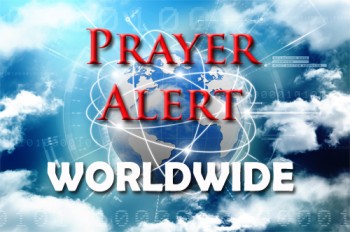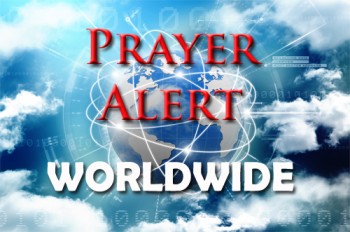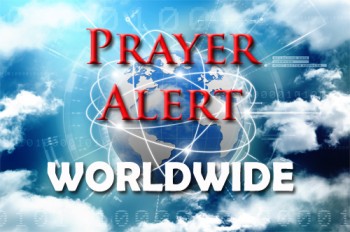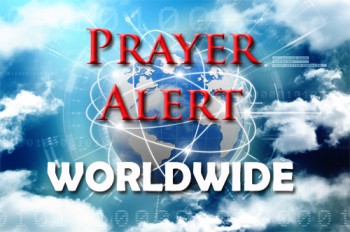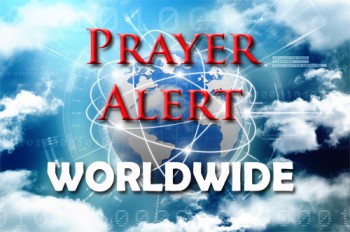Displaying items by tag: Myanmar
Myanmar: army promises new elections amid protests
The military held its first news conference since toppling the government. They said the armed forces would not remain in power for long, and would ‘hand power back to the winning party’ following another election. On 18 February the military ordered more arrests, and civil servants went on strike. Large numbers have protested for 16 days. ‘It is incredible to witness that our people are unified. People’s power must return to the people,’ actor Lu Min wrote on Facebook. Many of the country’s lawyers have joined the Red Ribbon Campaign calling for the restoration of democracy in the country. The Defend Lawyers website reported that forty barristers could face prosecution for participating in the anti-coup movement. Doctors Without Borders are ‘gravely concerned’ about the recent arrests and detentions of health care workers and other civilians. The situation has the potential to severely interrupt the lifesaving healthcare that they and others have been providing to the most vulnerable people in the country, particularly in the time of the Covid pandemic.
Rescued from slavery
IJM Thailand was informed by the Myanmar embassy of a potential human trafficking and forced labour case. 18 Myanmar workers needed rescuing from a confectionery factory in Bangkok. They were illegally brought in and wanted to leave, but could not. IJM personnel, embassy staff, and other agencies went to a residential neighborhood and attempted to call out to the workers locked in the upper floors of a building behind locked gates. Eventually, one worker began to climb out over the gate and a ladder was brought to help him escape. 17 other migrant workers followed him to freedom. They will undergo Covid testing and continue to receive IJM legal and aftercare support in a safe location. Pray for the successful prosecution of their captors and traffickers.
Myanmar: Christian villagers flee military
Thousands of Christian villagers fled military bombardment in Karen State on the same day that Myanmar leader, Aung San Suu Kyi, was ousted from power in a military coup. The army shelled districts of mainly Christian ethnic Karen villagers, forcing them to escape into inhospitable mountainous jungle with what little they could carry. Tens of thousands of people have taken to the streets in protest since Aung San Suu Kyi and her party, the National League for Democracy, were overthrown three months after winning a landslide election They have been replaced with a military government. The ethnic cleansing tactics used by the army against the Kachin were condemned in a 2018 UN Human Rights Council report with many testimonies of torture, rape and other abuses by military personnel. In 2020, 100,000 predominantly Christian Kachin remained scattered across 138 refugee camps, in crowded conditions with little sanitation and at great risk from coronavirus.
Myanmar: military coup
Myanmar's military took power on 1 February. Aung San Suu Kyi and her National League for Democracy party are now under arrest. The coup ends a democratic experiment in a country where generals usually rule. In 2017 Suu Kyi shocked the West by defending the generals’ ‘ethnic cleansing’ of the Rohingya Muslims. But as her star faded in the West, it became brighter at home where the Rohingya are considered invaders. Riding on her popularity, her party won last November's election, intensifying tensions between the civilian government and the army. The generals only won 7% of the vote and cried election fraud, threatening to suspend the constitution if their claims were not investigated. This coup reverses the generals' declining influence in one fell swoop. The new leader, Senior General Min Aung Hlaing, will remain in charge until 2022. Meanwhile, the economy will be crippled by fresh international sanctions, and Myanmar will become the pariah it was a decade ago. There have been widespread civilian protests against the coup, and the military have responded by shutting down Facebook ‘for the sake of stability’.
Myanmar: pandemic threatens Rohingya
130,000 internally displaced Rohingya trapped in detention camps in Myanmar have no future, with little access to land or livelihoods. They depend on foreign aid and die of treatable diseases due to limited healthcare. Shelters, built in 2012 to last two years, have deteriorated. Children only attend basic classes in temporary learning spaces. The authorities are using coronavirus response measures as a pretext to harass the Rohingya, who have told Human Rights Watch (HRW) that military and police forces regularly subject them to harassment and punishment at checkpoints. Police at a checkpoint made a woman do sit-ups for thirty minutes for not wearing a mask; she was then too exhausted to move. People must perform squats at checkpoints with their hands on their ears. HRW said, ‘The reality is dire. Oppressive and systemic restrictions imposed on those remaining in Myanmar may be indicative of ongoing genocide.’
WORLD WATCH LIST - Global trends in 2019
Open Doors latest report brings much sobering reading, but also a few positive glimmers.
In Brief:
North Korea (1) tops the World Watch List for the 18th year in a row. Despite its ranking in the top slot it did free three Korean-American Christians from a North Korean prison.
Persecution of Christians is getting worse. Five years ago only one country – North Korea – was ranked in the ‘extreme’ category for its level of persecution of Christians. This year, 11 countries score enough to fit that category.
China (27) has risen 16 places in the list after new Regulations for Religious Affairs came into force in February 2018.
In Myanmar (18) tens of thousands of members of the Karen tribe – a majority-Christian ethnic tribe – have been killed and least 120,000 displaced.
India (10) has entered the top ten for the first time. The BJP-led government continues to promote an extremist militant Hindu agenda.
In Turkey (26) President Recep Tayyip Erdogan has been stirring up ultra-nationalistic sentiment for some time and this has caused added difficulties for Christians in Turkey, especially Evangelicals.
As radical Islam has been forced out of the Middle East, it has spread into sub-Saharan Africa. Almost 30 violent Islamic extremist groups are known to be active in the region.
Islamic militants also have also gained strength in failed states like Somalia (3), Libya (4) and Yemen (8), where they continue to recruit, and capture pockets of territory.
The two places where Christians suffer the most violence are Nigeria (12) and Pakistan (5).
THE WORLD WATCH LIST: THREE MAIN TRENDS
Three major trends have shaped persecution against Christians this year:
Authoritarian states are clamping down and using legal regulations to control religion.
Ultra-nationalists are depicting Christians as ‘alien’ or ‘western’ and trying to drive them out.
Radical Islam has moved from the Middle East to sub-Saharan Africa.
GOOD NEWS
It’s not all bad news! There is light in the darkness, and the courageous faith of Christians is evident, even in the harshest conditions.
Worldwide: Above all, the World Watch List shows that the church is active and alive. Persecution is rising – but that only happens where the church is actively sharing the gospel and living it out.
Read the full report and download resources from the Open Doors Website Here: https://www.opendoorsuk.org/persecution/trends/
Pray: Lets continue to be in prayer for the estimated 245 million people worldwide who are persecuted for their Christian faith.
Pray: For those who are in prison, detention or separation from their families, due to their faith.
Pray: For the estimated 11 people a day who are martyred for being a Christian – and for their families and loved ones. (Rev 2:10)
Pray: For strength and encouragement for the Church of Christ – that it will continue to grow and flourish despite the persecution.
Myanmar: kidnapped pastor could be dead
On 19 January, in Myanmar, Pastor Tun was kidnapped with several others and held captive by a group of Buddhist militants. He is believed to be dead, but Barnabas’ contacts in the region say that his body has not yet been found. Pastor Tun was a spokesman for his village, and his missionary work made him a target by the ‘truly brutal’ group. Concerns are mounting that more abductions of Christians are likely.
Myanmar: refugee status lost
At least 28,000 ethnic Chin (mainly Christian) refugees in Malaysia and India have lost their refugee status and are faced with returning to Buddhist-majority Myanmar (Burma), where they risk discrimination and military attack. The status change is a result of a policy revision by the UNHCR, which has stated that 'the conditions that would normally produce refugees no longer exist' in Chin province. Most Christians in Myanmar come from ethnic minorities. Kachin Christians in northern Myanmar are already facing a genocidal campaign of ethnic cleansing by the military. The thousands of Chin Christian refugees now face a terrible choice: risk returning to a place of conflict and persecution, or remain as illegal immigrants facing a life of poverty or potential imprisonment. To understand the situation better, see https://missionsbox.org/news/making-sense-myanmar-chin-kachin-shan-wa-states-uwsa/
Myanmar: religious persecution
Myanmar has 100+ ethnic groups, and over 2,200 Buddhist temples. It is rich in natural resources such as gems, oil, and natural gas. The military holds great influence in the government, forcibly repressing popular democratic movements and exploiting the country's rich natural resources, leaving the nation’s economy in shambles. Many are in poverty. Additionally, Myanmar suffers the second highest HIV/AIDS rate in southeast Asia, with a reported 54% of adults and 78% of children receiving treatment. The creation and use of illegal drugs is a contributing factor to this epidemic. It has been reported that at least 200,000 households are involved in the production of poppies, the source of illegal opiates. Recently, the largest human exodus since the Vietnam War began as Rohingya Muslims were driven out in what the UN described as ‘ethnic cleansing at the hands of the military’. Myanmar is 80% Buddhist, 8% Christian, and 7% Muslim. 84% remain unreached with the Gospel. Freedom of religion is restricted. The military actively promote Buddhism.
Myanmar: human rights crisis
Oscar-winning actor Cate Blanchett described to the UN security council meeting in New York 'gut-wrenching' accounts from Myanmar of Rohingya people being tortured, raped and killed in front of their relatives. 'How can any mother endure seeing her child thrown into a fire?' she said. The UNHCR goodwill ambassador also praised Bangladesh for taking in more than 700,000 refugees, calling it 'one of the most visible and significant gestures of humanity of our time'. UN secretary general António Guterres has called for those behind the Rohingya crisis to be held accountable, urging the council to act on what has become 'one of the world’s worst humanitarian and human rights crises'. However Aung San Suu Kyi probably won't be stripped of her Nobel peace prize, despite revelations around the Rohingya crisis. The UN report said that Myanmar’s military carried out mass killings of Muslim Rohingya. See
